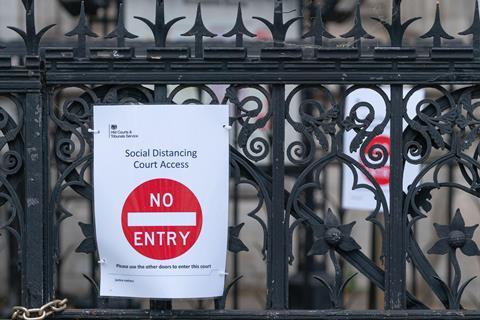The growing courts backlog poses the ‘greatest threat’ to criminal justice, Her Majesty’s chief inspectors for probation, constabulary, prisons and Crown Prosecution Service have warned in a worrying report published today on the impact of Covid-19.
The chief inspectors were ‘heartened’ that the system coped reasonably well with the immediate challenges of the pandemic. But ‘it is the significant backlog of cases which constitute the greatest threat to the proper operation of the [system]’, they said.
The inspection found ‘numerous examples’ of serious cases cancelled at short notice and warned that delays could result in crime victims being unwilling to support prosecutions. Increased time spent on remand will result in more anxious and frustrated prisoners, which could have a ‘serious adverse effect on the stability of reception prisons’. The National Probation Service, which will take over all offender management in a few months' time, is under pressure as court hearings resume.
Despite the criminal courts recovery plan, inspectors noted that the Crown court backlog is getting bigger – reaching more than 53,000 according to data published last month – and trials are being listed in 2022.

The situation in the courts is the chief inspectors' ‘greatest concern’. The report says: ‘The need to take urgent and significant action to reduce and eliminate what were already chronic backlogs in cases, and to make sure courts are secure and safe for all who attend and work in them, is urgent. Without this, the implications for victims, witnesses, defendants and prisoners are severe.'
A government spokesperson said today: ‘The chief inspectors rightly recognise the swift and unprecedented work that has kept the justice system moving in the face of the pandemic. These efforts have allowed us to rapidly increase the use of video technology, establish 36 Nightingale courtrooms and prioritise urgent cases to protect the public from dangerous criminals, while we were one of the first countries in the world to resume jury trials.
‘In recognition of the scale of the challenge we face, the government is investing £450m to boost recovery in the courts and deliver swifter justice, and this is already yielding results - the magistrates’ backlog continues to fall and Crown courts cases reached pre-pandemic levels last month.’
The Law Society said the Crown court backlog was already substantial prior to the pandemic.
David Greene, president, said: ‘Given the continuing impact of the pandemic - including the new more easily transmissible coronavirus variant - we have called for further steps to be taken to make the courts safer for all users. The gains sought to be achieved in pressing on regardless will be lost if such measures are not put in place. This is likely to lead to yet further delays due to court closures following outbreaks of coronavirus and due to staff, lawyers, judiciary and parties falling sick.’
Shadow justice secretary David Lammy MP said the Ministry of Justice had 'dithered and delayed' since the start of the coronavirus crisis, allowing the backlog to grow to more than 50,000 cases. 'Labour wants to ensure the UK justice system is the fairest and most effective in world,’ he said.
The chief inspectors will give evidence at the Commons justice select committee later today.



























12 Readers' comments